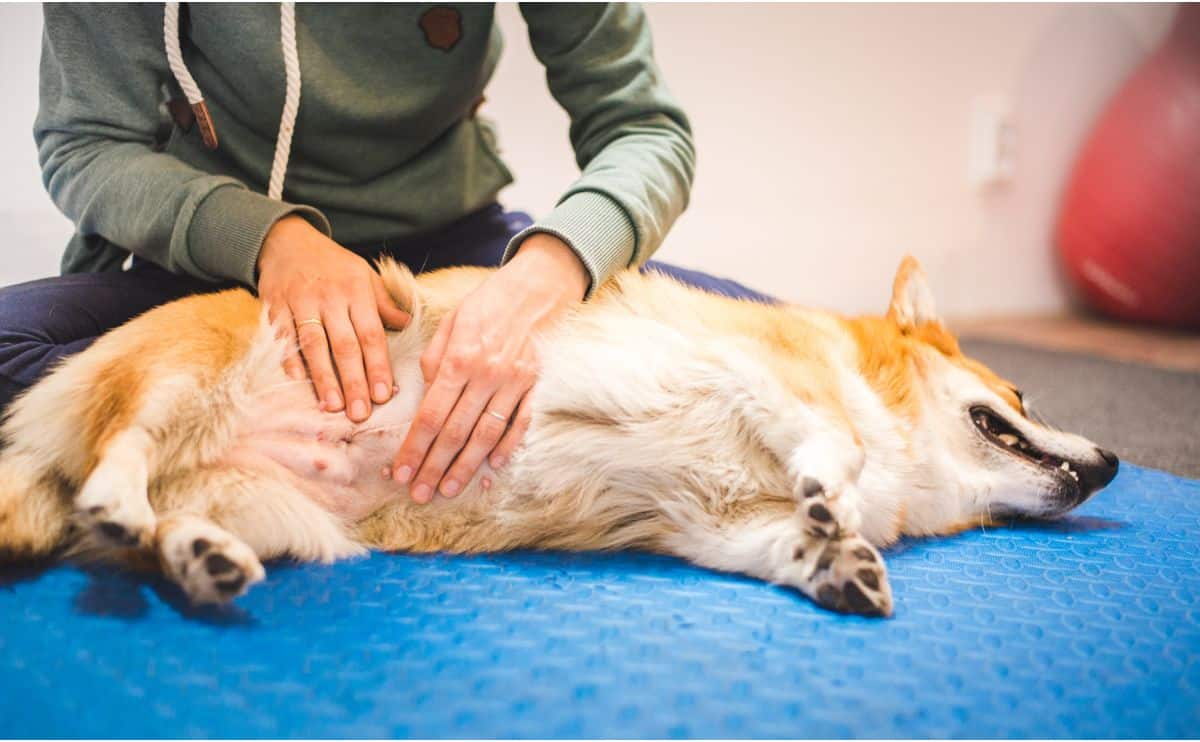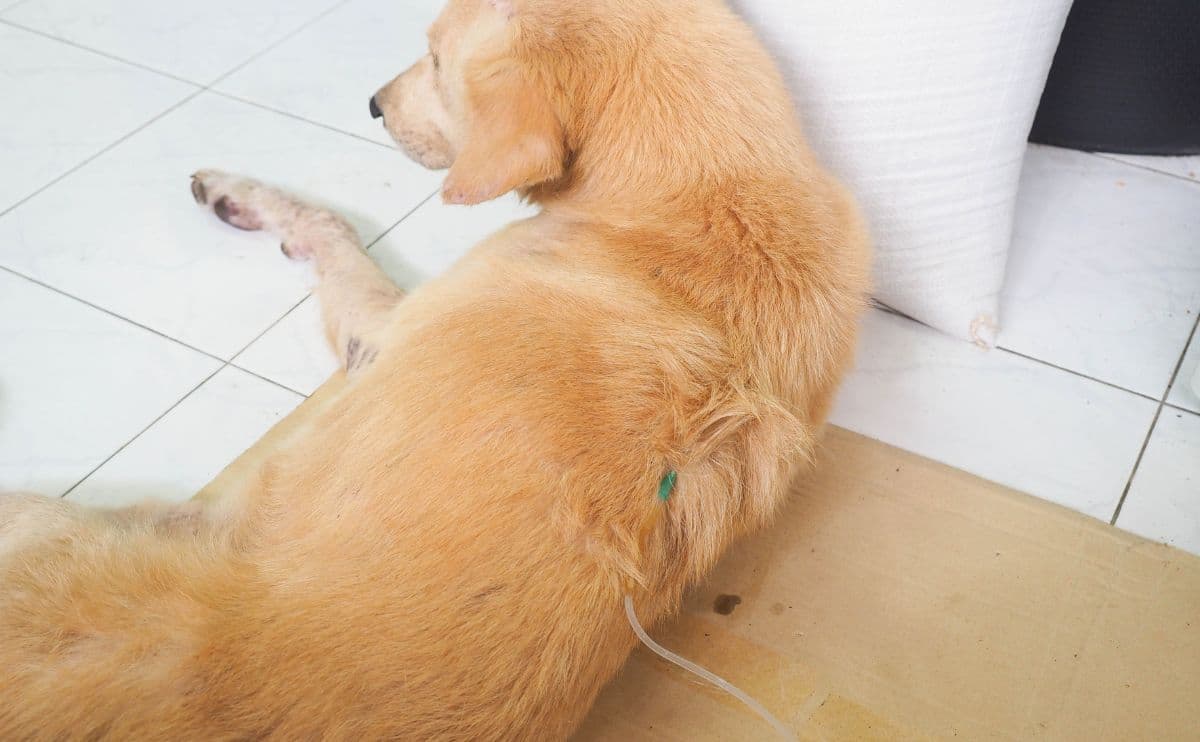This content was reviewed by veterinarian Dr. JoAnna Pendergrass, DVM.
When you purchase through links on our site, we may earn a commission. Here’s how it works.

Canine bloat is a fast-acting, life-threatening illness that requires emergency veterinary treatment. Knowing the symptoms beforehand is extremely important, so you can detect it early and get your dog the care he needs.
If you notice symptoms soon enough, your dog may be one of the few dogs to survive this terrible disease. Also, learning how to prevent canine bloat can help protect your dog from this scary disease.
What Is Canine Bloat?

Gastric dilatation-volvulus is the scientific term for canine bloat, also known as gastric torsion. Canine bloat is a serious and often life-threatening illness that strikes many dogs every year, and the outcome of each dog’s affliction depends on various factors.
Much like humans, a dog’s stomach resembles a balloon. For us, humans, overeating and eating too quickly can result in bloating, gas, and general discomfort, but we can recover quickly with minimal illness. Dogs, however, are not so fortunate, and what begins as gas can soon turn into something much worse.
My Dog Ate Too Much Food
If a dog eats too much or too quickly, canine bloat can occur. During the passing of the food to the stomach, there is a buildup of gasses, and the stomach begins to blow up like a large balloon. As gasses continue to build up, the stomach stretches beyond its limits and prevents blood circulation to the heart. The stomach also experiences a lack of blood flow which can result in the death of stomach tissue.
In many cases of bloat, the dog’s stomach twists at the top and bottom, cutting off the stomach from the esophagus and pyloric valve (entrance to the small intestine), preventing gas from moving out of the stomach. When this occurs, the damage to the stomach is unrepairable due to cell death — veterinarians are not able to regenerate the dead tissue.
If a dog begins to show symptoms of bloat and it’s caught soon enough, it’s possible to untwist the stomach and relieve the buildup of gasses that are contributing to canine bloat.
Bloat can become fatal exceptionally quickly, and a dog can die within hours of the onset of bloat, so it’s vital to get medical attention immediately upon noticing symptoms.
Will A Dog With Bloat Still Want To Eat?
Dogs are food-oriented animals and might still show signs of hunger after canine bloat. But the condition is painful, so there is a chance your dog could stop eating as a result.
Dog Bloat Symptoms
Dog overeating symptoms can include:
- Change in personality and physical activity level
- Abdomen is larger, distended, and hard
- Lack of normal digestive sounds (place your ear on your dog’s stomach and note if there is any difference)
- Standing in a hunched-over position, unable to get comfortable
- Refusing to lie on their side
- Dry heaving or vomiting foam or mucus
- Anxiety
- Pacing
- Whining
- Licking the air
- Looking at their abdomen
- Standing with their legs spread
- Shallow breathing
- Weak pulse
- Collapsing to the ground
- Cold gums that are dark red (or blue or white in later stages)
- Unable to defecate
How To Treat Canine Bloat
The biggest factor in helping a dog survive canine bloat is the speed with which he gets treatment. The moment you think your dog is suffering from bloat, you should seek veterinary care immediately. Treatment is based on how advanced the bloat condition is.
A dog with canine bloat may be in shock, which must be treated before any treatment for bloat can begin. Treating the shock will stabilize the dog enough to begin bloat treatment.
If the stomach hasn’t twisted yet, the vet may sedate your dog and put a tube down your dog’s throat to help remove gas from the stomach.
If the stomach has begun twisting, your dog will require surgery. First, your vet will deflate and untwist the stomach, which will help alleviate pressure from gas. Then, they will staple the stomach to one side of the abdominal wall (gastropexy) to help prevent canine bloat in the future.
Unfortunately, despite emergency treatment, canine bloat is highly fatal. If your dog survives treatment, you should schedule a follow-up exam afterward to ensure there is no remaining damage. Any remaining dead stomach tissue must be surgically removed to help maintain proper stomach function.
What Causes Canine Bloat?
Veterinarians have no definitive data as to why canine bloat occurs. There are some theories, which are listed below.
One Large Meal Per Day
One of the factors is feeding one large meal per day instead of two or three smaller meals. Part of this theory comes from the fact that a dog who eats only once a day is generally starving by the time mealtime rolls around. He will gulp his food down quickly and, along with it, will swallow large pockets of air that contribute to gas buildup in the stomach.
Extreme Exercise Near Mealtime
Dogs should have one hour before and after vigorous exercise to calm down from play before eating. Exercise before meals can leave the dog riled up and extremely eager to eat, which again leads to the gulping of food and large pockets of air. Eating too quickly before exercise can also result in bloat because running can cause dogs to swallow large pockets of air, again contributing to gas buildup in the dog’s stomach.
Excessive Grain In Kibble
Some vets reject this theory, but others accept it because excessive grain in dry kibble can lead to fermentation during digestion, which releases a large amount of gas.
Drinking Lots Of Water During Mealtime
When a dog swallows large gulps of water, he also gulps large pockets of air that can build up in the stomach. Many think that this potential cause of bloat can be eliminated by removing water from the dog’s reach while he is eating and making it freely available at all other times.
Does Dog Size & Breed Play A Factor?
Large breed dogs are generally more susceptible to bloat than smaller dogs because they tend to eat larger meals and swallow greater amounts at one time. However, this does not mean that small dogs do not bloat; plenty of small dogs have suffered from canine bloat.
Certain dog breeds are also more susceptible to bloat due to the shape of their chest. Dogs that are “barrel-chested” or “deep-chested” (the sternum hangs down at a lower point from the backbone than in small-chested dogs) are prone to canine bloat.
In one large study published in the Journal of the American Veterinary Medical Association, researchers analyzed medical records of more than 27,000 dogs from the UC-Davis veterinary clinic to compare the incidence of 24 genetic disorders in mixed versus purebred dogs. They found that the risk of bloat was significantly higher in purebreds. The breeds with the highest rates of bloat in this study were Saint Bernards, Irish Setters, Bloodhounds, Great Danes, and Irish Wolfhounds.
These and other breeds noted for a high incidence of canine bloat include:
| Airedale Terriers | Akitas | Basset Hounds |
| Bernese Mountain Dogs | Bloodhounds | Borzoi’s |
| Bullmastiffs | Dachshunds | Doberman Pinschers |
| Gordon Setters | Great Danes | Irish Setters |
| Irish Wolfhounds | Labrador Retrievers | Mastiffs |
| Newfoundlands | Saint Bernards | Standard Poodles |
| Rottweilers | Weimaraners |
Is Canine Bloat Hereditary?
If your dog’s parent or sibling has suffered from bloat, it’s likely that your dog will too. Dogs are also at higher risk for bloat if they are excessively thin; this results from a dog’s eagerness to eat when starved and underweight. If your dog is underweight, you can help reduce his risk of bloat by getting him to a healthy weight. For example, feed him several small meals throughout the day. Your vet can recommend a diet plan to help your dog gain weight and get the nutrients he needs.
For this same reason, dogs that are fearful or anxious should also be fed small meals in areas of their home where they feel most secure. A dog that’s fearful of losing his food for any reason will eat quickly and likely swallow large pockets of air.
Canine Bloat Infographic
Here’s a graphic summarizing what it is and how to treat and prevent bloat in your pup.

Sample Claim From Fetch
Below is a claim filed with Fetch for canine bloat.
- Dog: Connor, 6-year-old male German Shepherd
- Total Vet Cost: $2,944.94
- Plan Details: $200 deductible (per condition, annually); 80% reimbursement
- Total Reimbursed: $2,311.89
How Can I Keep My Dog From Eating Too Much?
If you think your puppy ate too much and is now bloated or your dog has overeaten and is suffering from canine bloat, you should seek vet care immediately. Try to prevent overeating in the future by splitting up meals and using a slow-feeder dog bowl to help keep your dog from wolfing his food down too quickly.
Tagged With: Digestion, Gastrointestinal, Reviewed By Dr. Pendergrass, DVM

